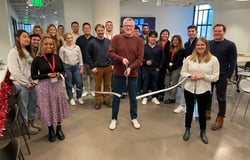Responsibilities
- Collaborate in the design and development of fully automated QC methods
- Analyze automation workflows to identify bottlenecks and areas for optimization
- Troubleshoot and resolve technical issues related to automation systems and instrumentation
- Develop sample and reagent format and storage management strategies
- Coordinate DoEs (Design of Experiments) to optimize assay method parameters
- Coordinate the validation and verification testing of automated methods to ensure precision, accuracy, and reproducibility of results
- Implement quality control measures to maintain the high-quality generation
- Implement troubleshooting methodologies to identify and resolve complex assay method issues
Requirements
- Master's or Ph.D. in Bioengineering, Biotechnology, Chemistry, Molecular Biology, or a related field
- 3+ years of relevant experience
- Experience with assay method development for high-throughput screening
- Experience with laboratory analytical instruments and automated systems
- Experience with laboratory information systems (LIMS) and data analysis tools
- Familiarity with DoE (Design of Experiments) principles and best practices
- Strong technical writing skills and experience authoring Standard Operating Procedures (SOPs), documentation, and training materials
- Familiarity with GMP compliance requirements
- Familiarity with statistical analysis software tools
- Creative, self-motivated, eager to take on a wide variety of tasks and grow with the evolving technology
- Self-awareness, integrity, authenticity, and a growth mindset
Similar Jobs

What We Do
Cellares is revolutionizing cell therapy manufacturing. We are developing a one-of-a-kind solution, The Cell Shuttle, to overcome the challenges associated with manufacturing so these life-saving therapies are affordable and widely available to patients who can benefit.
The clinical impact of cell therapy in treating cancer has been proven, but this therapeutic approach has several limitations, especially in manufacturing, leaving extremely sick patients waiting for treatment and desperate for hope.
Since cell therapy is currently produced for a single patient at a time, it is expensive to manufacture, requiring significant time and resources, and is difficult to scale.
Preclinical and clinical scientists, as well as commercial cell therapy manufacturers also lack the options to fully automate their manufacturing process quickly, safely, cost-effectively and at the scale they need.
The Cell Shuttle is an automated and closed end-to-end manufacturing solution that is flexible and scalable, enabling customers to run exact processes specified for their cell therapy. Compared with the current manual manufacturing processes for cell therapy, the Cell Shuttle’s next-generation automated manufacturing solution has 10 times the scalability (meaning 10 times more patient doses can be produced simultaneously), enables a three-fold reduction in process failure rates and will reduce the per-patient manufacturing cost by up to 70 percent for most processes.







